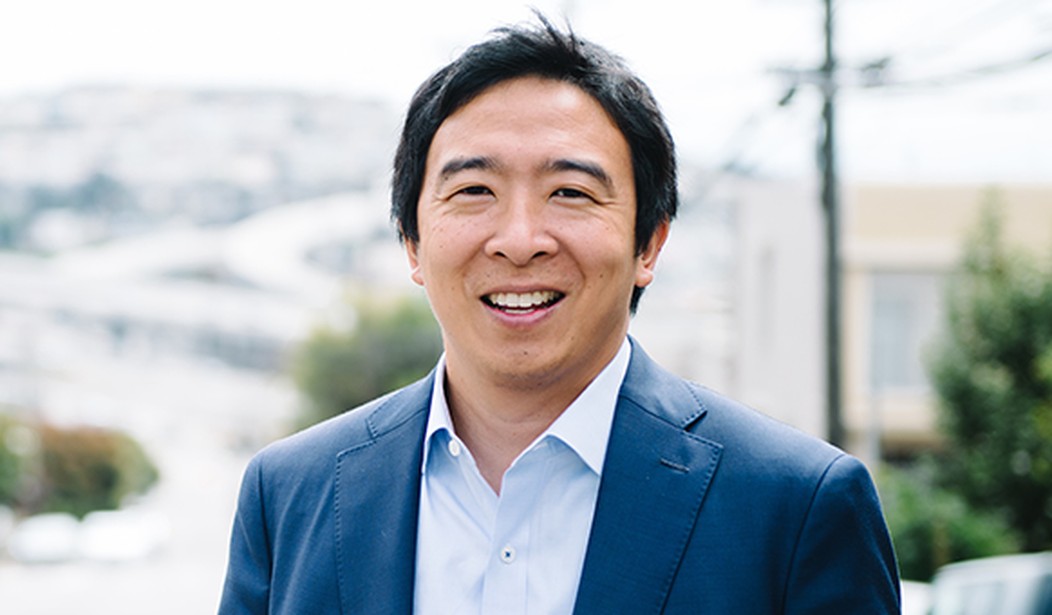"I kind of miss the days of 3 major networks and a few news programs that said the same thing," he said.
"While we can't get back there, we need to establish some rules of the road and standards so that our national discourse doesn't degenerate into a million incoherent news bubbles," he added.
Who will make and enforce these "rules of the road" for American speech?
"I will appoint a new News and Information Ombudsman with the power to fine egregious corporate offenders," he said. "One of the main purposes of the Ombudsman will be to identify sources of spurious information that are associated with foreign nationals. The Ombudsman will work with social media companies to identify fraudulent accounts and disable and punish responsible parties. The Ombudsman will be part of the Federal Communications Commission."
Who is this "I" who would appoint a new federal bureaucrat to watch over the nation's online communications?
You may not have heard of Andrew Yang yet, but he is a Democratic presidential candidate. The statements above are posted on his campaign website.
Yang, a New Yorker who founded the nonprofit Venture for America, says he believes in a "free press" -- but that the government needs to "start monitoring and punishing bad actors" in this realm.
If not, he argues, "foreign actors" -- such as the Russians -- might exploit the "freedom of information" in the United States.
"We need a robust free press and exchange of information," Yang says on his campaign website.
"But we should face the reality that fake news and misinformation spread via social media threatens to undermine our democracy and may make it impossible for citizens to make informed decisions on a shared set of facts," he says. "We need to ... give the determined journalists a chance to do their work."
Recommended
Will the "determined journalists" given a "chance to do their work" by the government monitors envisioned in this plan be those who believe in the principles of limited government enshrined in the U.S. Constitution? Will they be those who respect the laws of nature and nature's God cited in the Declaration of Independence?
On a page entitled "Media Fragmentation," Yang's campaign website reiterates that he favors "freedom of the press" but laments that the press is not united by one set of "shared values."
"Outside of extreme cases of malicious libel, the freedom of the press is inviolate," the page reads. "However, the fragmentation of our media is a growing problem. Different communities are receiving their news exclusively through different channels, resulting in world views with different 'facts' that rarely overlap. We can't decide on shared values if we don't agree on basic facts; we can find shared solutions if we don't even agree what the problems are."
The page lists as a goal of this plan, "Reunify the press."
Around what values does Yang hope to "reunify" the press?
What about life? "As President," he says elsewhere on his website, "I will ... Support a woman's right to choose in every circumstance and provide resources for planning and contraception."
Does he value a "right to choose" in other health care decisions?
"We need to provide high-quality healthcare to all Americans and a single-payer system is the most efficient way to accomplish that," he says.
Recognizing the financial difficulties local newspapers face in this era, Yang also presents some plans for revitalizing local journalism.
The main driver for this? Government.
Government will fund local news organizations. "I will initiate the Local Journalism Fund, a dedicated $1 billion fund operated out of the FCC that will make grants to companies, non-profits and local governments and libraries to help local newspapers, periodicals and websites transition to sustainability in a new era," he says.
And government will fund local journalists. "I will initiate the American Journalism Fellows, through which reporters from each state nominated by a body of industry professionals and selected by a nonpartisan commission will be given a 4-year grant of $400,000 ($100,000 per year) and stationed at a local news organization with the condition that they report on issues relevant to the district during the period of their Fellowship," he says.
In other words, American journalism would become exactly what it should not be: a subsidiary of government. Journalism's highest calling is to protect individual liberty against unjust government intrusion.
Thus, great journalistic institutions fight to protect the rights to life, liberty and property against overreaching government. Those that join with government to infringe on our rights do exactly the opposite of what they ought to do.
They are not defenders of freedom; they are its enemies.
Yang's campaign already has more than 65,000 contributors, the minimum threshold the Democratic Party has set for the maximum of 20 candidates who will be allowed to participate in the first presidential debates scheduled for June and July.
If Yang joins those debates, how many of his rivals will challenge his plan to empower the government to regulate speech?
Terence P. Jeffrey is the editor in chief of CNSnews.com.

























Join the conversation as a VIP Member